#13th amendment
Text
#talkin#tik tok#theconsciouslee#slavery#13th amendment#racism#alabama#lousiana#oregon#tennessee#vermont#mid term elections#1k#2k#3k#4k#5k#6k#7k#8k#9k#10k#11k#12k
31K notes
·
View notes
Text
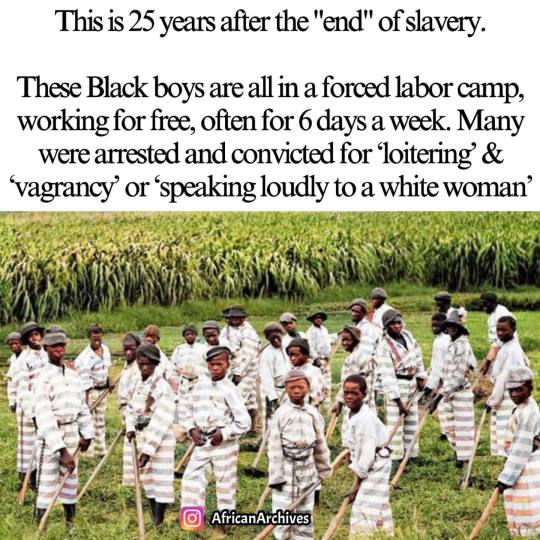
In 1865, enslaved people in Texas were notified by Union Civil War soldiers about the abolition of slavery. This was 2.5 years after the final Emancipation Proclamation which freed all enslaved Black Americans.
But Slavery Continued… In 1866, a year after the amendment was ratified, Alabama, Texas, Louisiana, Arkansas, Georgia, Mississippi, Florida, Tennessee, and South Carolina began to lease out convicts for labor.
This made the business of arresting black people very lucrative, thus hundreds of white men were hired by these states as police officers.
Their primary responsibility being to search out and arrest black peoples who were in violation of ‘Black Codes’
Basically, black codes were a series of laws criminalizing legal activity for black people. Through the enforcement of these laws, they could be imprisoned.
Once arrested, these men, women & children would be leased to plantations or they would be leased to work at coal mines, or railroad companies. The owners of these businesses would pay the state for every prisoner who worked for them; prison labor.
It’s believed that after the passing of the 13th Amendment, more than 800,000 Black people were part of that system of re-enslavement through the prison system.
The 13th Amendment declared that "Neither slavery nor involuntary servitude, except as a punishment for crime whereof the party shall have been duly convicted, shall exist within the United States, or any place subject to their jurisdiction."
Lawmakers used this phrase to make petty offenses crimes. When Blacks were found guilty of committing these crimes, they were imprisoned and then leased out to the same businesses that lost slaves after the passing of the 13th Amendment.
The majority of White Southern farmers and business owners hated the 13th Amendment because it took away slave labor. As a way to appease them, the federal government turned a blind eye when southern states used this clause in the 13th Amendment to establish the Black Codes.
#slavery#emancipation proclamation#black americans#convict leasing#black codes#13th amendment#involuntary servitude#prison labor#re-enslavement#southern states#racial discrimination
514 notes
·
View notes
Text
Just going to leave this here...
464 notes
·
View notes
Text
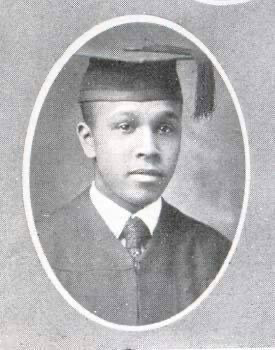

"Self Made Millionaire" Was one of the first African American inventors admitted into the National inventors Hall of Fame. Percy Julian specialized in making drugs and medications from plants. As a young college student bound for DePauw, Percy Julian watched his family standing on the stations platform. His Grandfather, a former slave freed by the 13th Amendment, waved a hand missing two fingers, cut off as punishment for learning to write
#african#afrakan#kemetic dreams#africans#brownskin#afrakans#brown skin#percy julian#depauw#13th amendment#african american
428 notes
·
View notes
Text

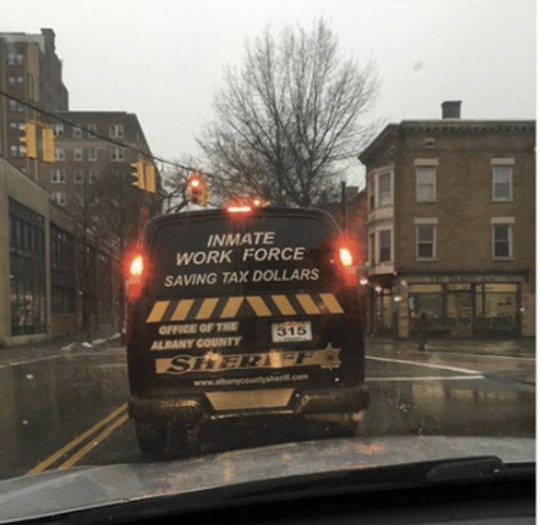


#abolish the prison industrial complex#us jails#us jail system#ftp#defund the police#defundthepolice#police brutality#blm#capitalism kills#capitalist system#abolishtheprisonindustrialcomplex#black lives matter#no justice no peace#albany#aclu#13th amendment#free labor
3K notes
·
View notes
Text
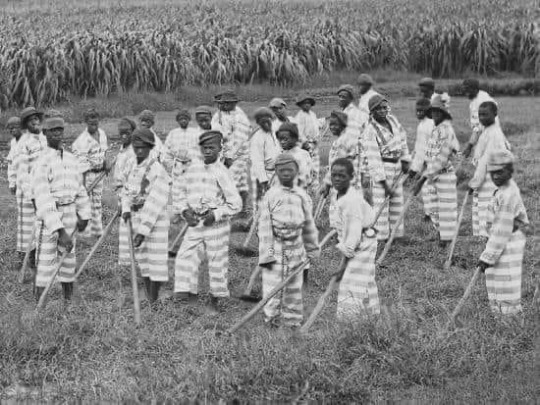
IF YOU DIDN'T KNOW THIS YESTERDAY THEN TODAY WOULD BE A GOOD DAY TO LEARN THIS.... "All stories don't have a happy ending"
In 1866, one year after the 13 Amendment was ratified (the amendment that ended slavery), Alabama, Texas, Louisiana, Arkansas, Georgia, Mississippi, Florida, Tennessee, and South Carolina began to lease out convicts for labor (peonage). This made the business of arresting Blacks very lucrative, which is why hundreds of White men were hired by these states as police officers. Their primary responsibility was to search out and arrest Blacks who were in violation of Black Codes. Once arrested, these men, women and children would be leased to plantations where they would harvest cotton, tobacco, sugar cane. Or they would be leased to work at coal mines, or railroad companies. The owners of these businesses would pay the state for every prisoner who worked for them; prison labor.
It is believed that after the passing of the 13th Amendment, more than 800,000 Blacks were part of the system of peonage, or re-enslavement through the prison system. Peonage didn’t end until after World War II began, around 1940.
This is how it happened.
The 13th Amendment declared that "Neither slavery nor involuntary servitude, except as a punishment for crime whereof the party shall have been duly convicted, shall exist within the United States, or any place subject to their jurisdiction." (Ratified in 1865)
Did you catch that? It says, “neither slavery nor involuntary servitude could occur except as a punishment for a crime". Lawmakers used this phrase to make petty offenses crimes. When Blacks were found guilty of committing these crimes, they were imprisoned and then leased out to the same businesses that lost slaves after the passing of the 13th Amendment. This system of convict labor is called peonage.
The majority of White Southern farmers and business owners hated the 13th Amendment because it took away slave labor. As a way to appease them, the federal government turned a blind eye when southern states used this clause in the 13th Amendment to establish laws called Black Codes. Here are some examples of Black Codes:
In Louisiana, it was illegal for a Black man to preach to Black congregations without special permission in writing from the president of the police. If caught, he could be arrested and fined. If he could not pay the fines, which were unbelievably high, he would be forced to work for an individual, or go to jail or prison where he would work until his debt was paid off.
If a Black person did not have a job, he or she could be arrested and imprisoned on the charge of vagrancy or loitering.
This next Black Code will make you cringe. In South Carolina, if the parent of a Black child was considered vagrant, the judicial system allowed the police and/or other government agencies to “apprentice” the child to an "employer". Males could be held until the age of 21, and females could be held until they were 18. Their owner had the legal right to inflict punishment on the child for disobedience, and to recapture them if they ran away.
This (peonage) is an example of systemic racism - Racism established and perpetuated by government systems. Slavery was made legal by the U.S. Government. Segregation, Black Codes, Jim Crow and peonage were all made legal by the government, and upheld by the judicial system. These acts of racism were built into the system, which is where the term “Systemic Racism” is derived.
This is the part of "Black History" that most of us were never told about.
400 notes
·
View notes
Text
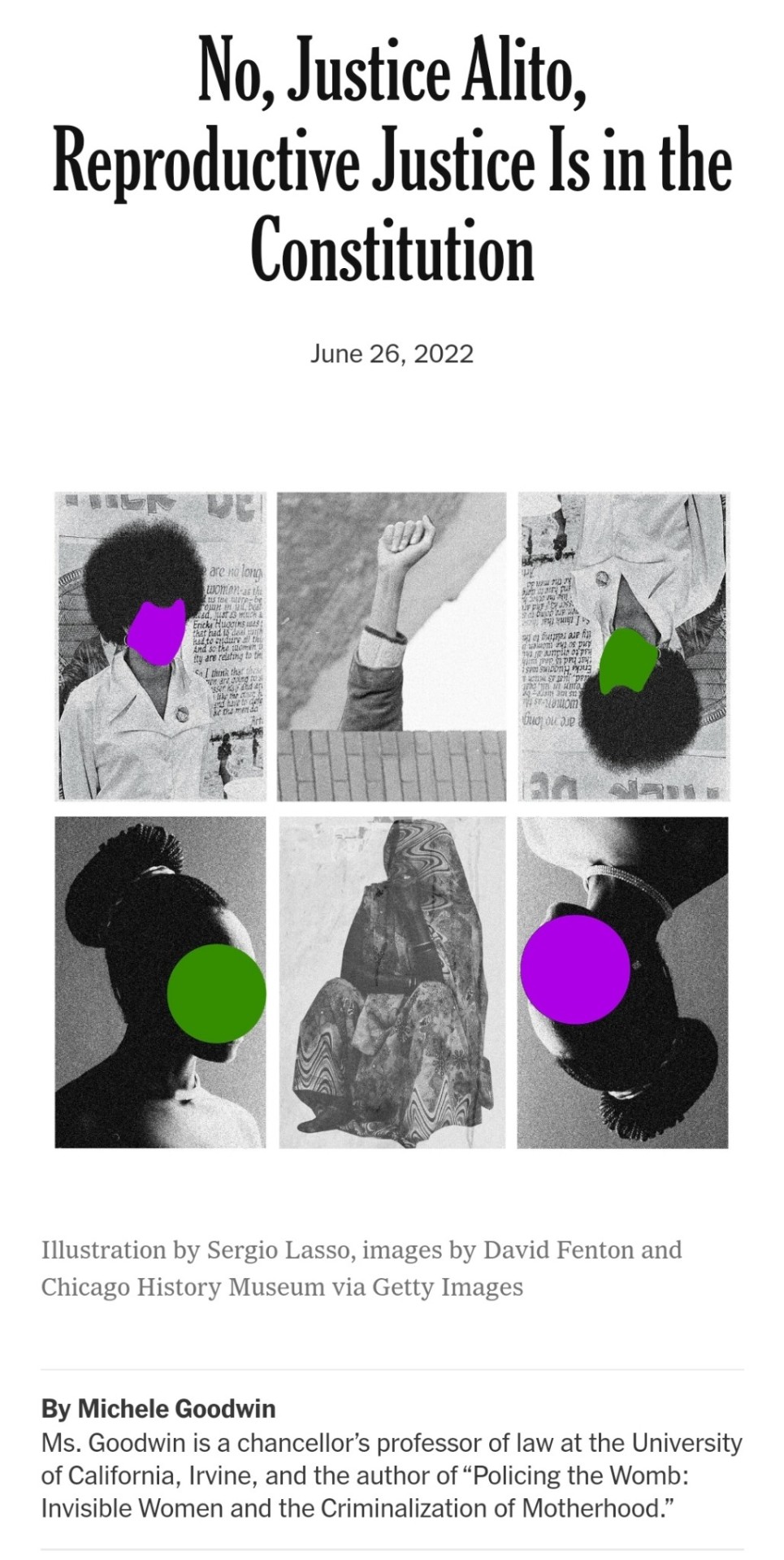

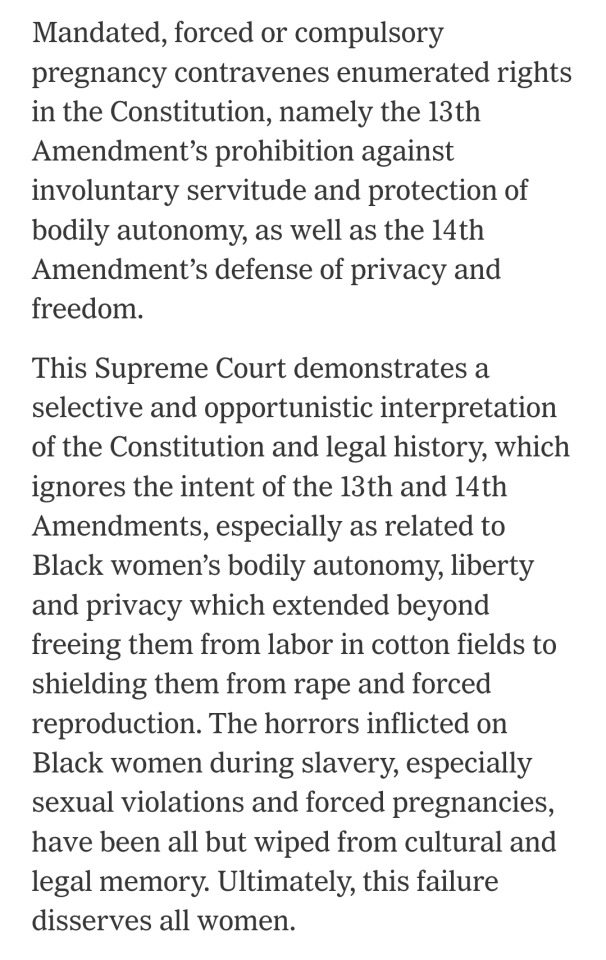
Conservatives have weaponized their personal beliefs. These are not legal scholars. They are unsophisticated and vile.
These originalists don't see the 13th Amendment as the answer to young black girls forced into reproduction in Antebellum America.
The 13th abolished involuntary servitude. It protected young girls from abusive men.
Women and girls will again to victims of abusive men forcing them into reproduction.
2K notes
·
View notes
Text
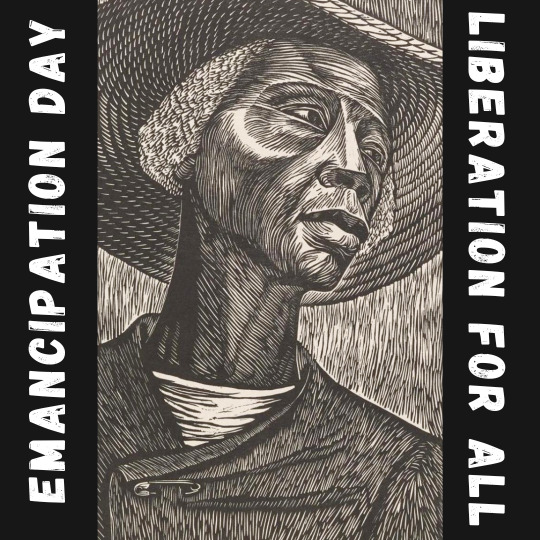
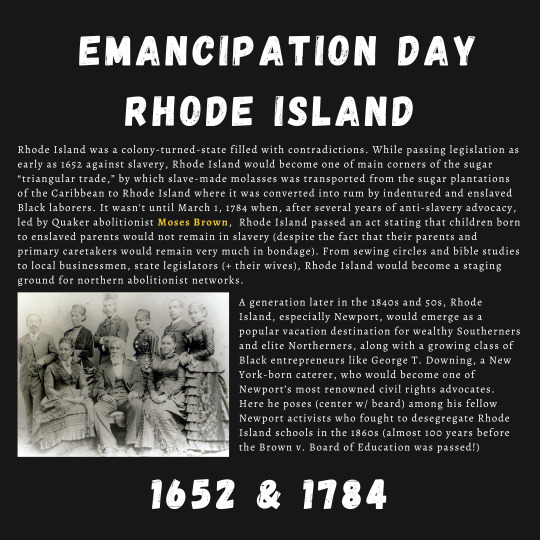
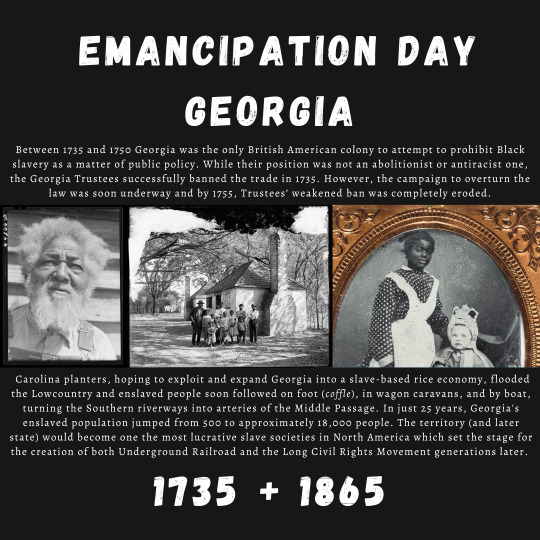
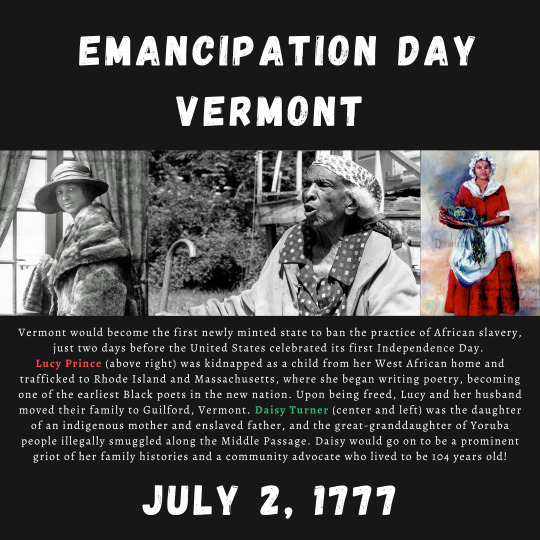
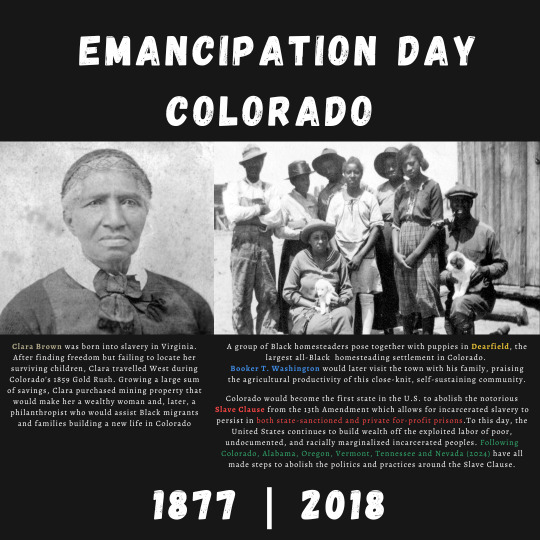
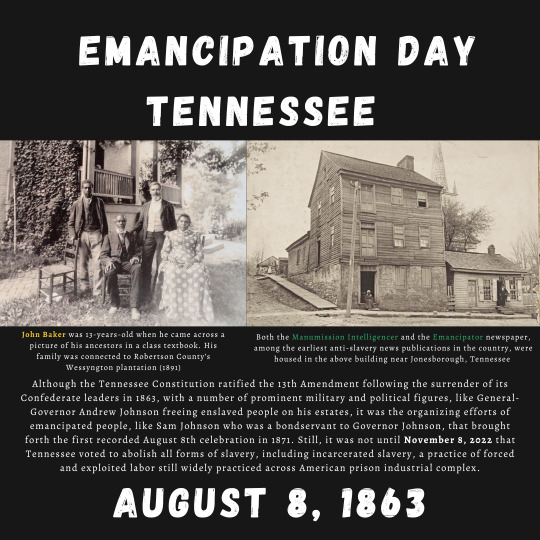
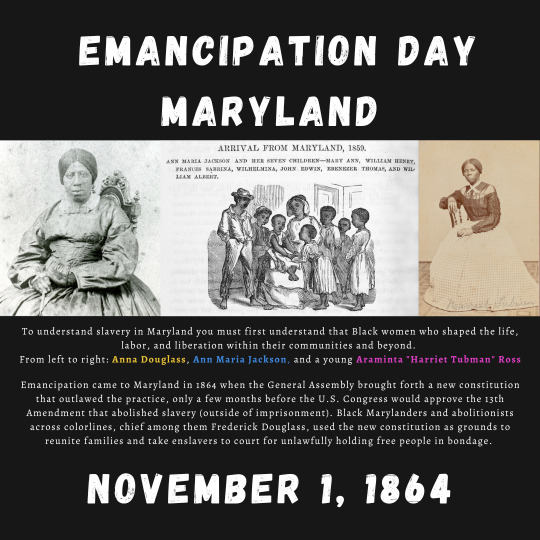
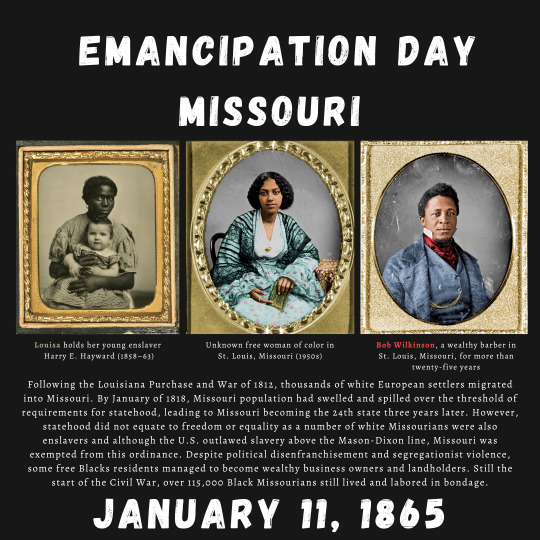
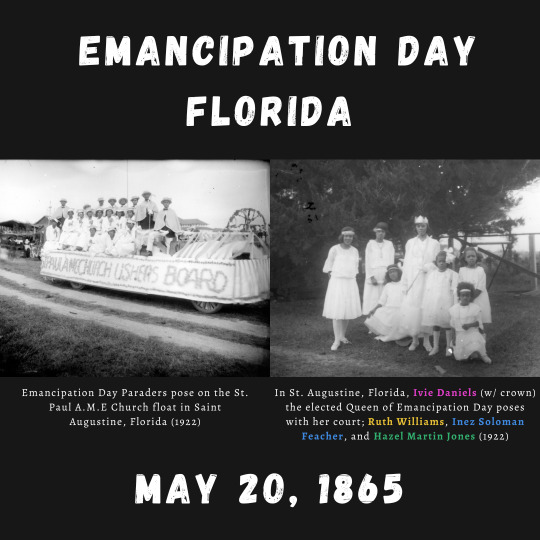
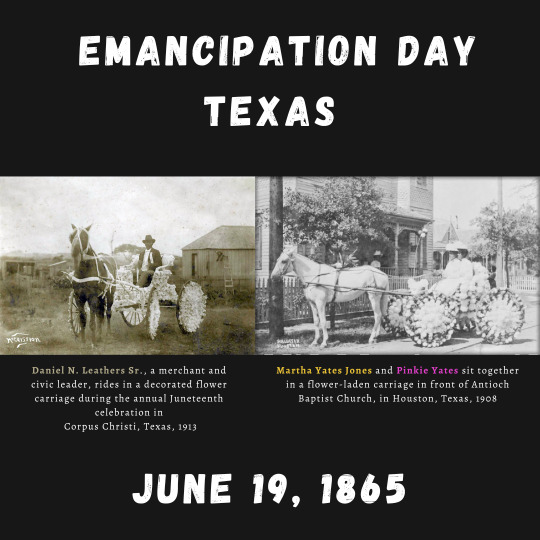
On August 8, 1863, Tennessee ratified the 13th Amendment, abolishing the domestic slave trade of Black + indigenous folks in the state. 159 years later in 2022, Tennessee folks voted to abolish all forms of slavery in the state, including the "Slavery Clause" that allows for incarcerated slavery to persist in both state-sanctioned + private for-profit prisons.To this day, the United States continues to build wealth off the exploited labor of impoverished, (dis)abled, undocumented + racially marginalized people who are incarcerated.
Each community and country that participated in the Transatlantic Slave Trade has its own emancipation day (or year).
And yet, as of 2023, Colorado, Alabama, Oregon, Vermont, Tennessee + Nevada (2024) are the only U.S. states who have made steps to abolish slavery in all its forms. That's not even touching how slavery, both state-sanctioned and illegal bondage, continues to bleed into our everyday places from child labor + forced s*x work to penal plantations and chocolate factories (looking at you at hershey chocolate)
In this second wave of Jim & Jane Crow flooding our world, we must arm ourselves with the tools to disrupt systems, distribute resources + deepen our collective action + good trouble ~
If you wanna explore the full Emancipation post + readings, come join us in the garden community over on Patreon where we upRoot our miseducation through history lessons, community conversations + book talks + decolonizing our everyday practic, our classrooms + our communities.
Reclaim your emancipation + immerse yourself in the ancestral, antiracist liberation! 🖤✊🏾✨️
#prison abolition#our world#black lives matter#ecosystem of white supremacy#our history is your history#politics#13th amendment#padawan historian#cite black women#reclaim the fourth#emancipation day
88 notes
·
View notes
Photo
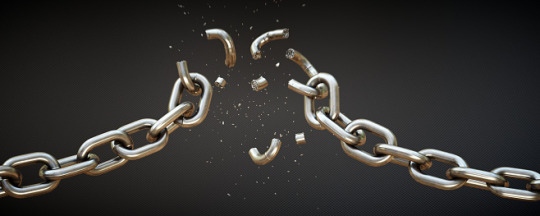
Do World Powers Engage in Subtle Systemic Slavery or Overt Systemic Slavery? It doesn’t Matter. Slavery is Slavery & It Will Never Be Needed Especially Not As A System.
The United States along with other world powers and those that serve them have created this ‘using us, yet against us’ system. We need to change this. The fire James Baldwin spoke of, the very merited rage those enslaved have against this system, is well overdue.
Those who serve a government that knowingly allow for enslavement still and lie to people about it being abolished when their own amendment backs daily institutional and systemic enslavement when it allows “slavery is abolished except in punishment or crime“. This does nothing to remove slavery as a systemic feature from this governing system and you are implicit.
by - K, Blog Admin
What happens when we as a community repurpose the instruments of science and evidence gathering and focus on the 13th amendment? This piece of document literally allows for enslavement. What has been created in its wake?
Here’s the thing, when colonial imperial powers in Europe said okay when issues occur we’re gonna call them ‘crime’ they meant it as a word to account for social norms being breached and a sort of “holler if you hear me“ approach to solving those issues was laid out institutionally which included neighborhood watch people that could process this. They later became police. Between that time and the present 2023, legislature and policy reshaped crime and policing, as well as the defending of issues through military, crime became systemically synonymous with prisons/cages/slavery to solve those issues.
From the Trans-Atlantic slave trade and its bolstering of these pro enslavement laws to this past historical investment in this strange notion of punishing others so physically, violently to the benefit of a system, a legalized market of slavery was formed and continues to persist with similar legislative and political play on words as they did with the 13th amendment’s clause:
The 13th Amendment to the United States Constitution provides that "Neither slavery nor involuntary servitude, except as a punishment for crime whereof the party shall have been duly convicted, shall exist within the United States, or any place subject to their jurisdiction."
When you specifically write into law and action that amendments create and actualize the means to the system we use, what are you enacting when you pronounce through this same mechanism that “no slavery shall exist within the united states or any place subject to its jurisdiction - EXCEPT as punishment for crime“?
We need to, as a people really inspect this slowly and carefully because science has yet to produce any evidence that says punishment at that level and method is required to solve these issues so where is this evidence that says that type of punishment is even needed for the people to “fall in line”?
Secondly, isn’t it evident that processing issues as merely ‘crime’ is factually bringing us more structural issues than not because not every issue can be generalized to crime and often times the word crime itself just doesn’t do nearly enough to account for the disabled community and many other far reaching issues.
These aren’t assumptions, these are educated deductions based on statistical data provided by the errors of the running system. Again, it has yet to produce reputable convincing evidence that establishes prisons, crime, and cops/ slave patrol systems they synergized with as effective means to solve the issues we as a society constantly face.
And with this same lack of adhering to scientific facts are we supposed to feel comforted by these slave industry agents, legislators and policy makers that allow for that amendment to exist as is because they know it buys them that much time to not worry of their implicitness in enslavement of others?
I implore everyone watch the documentary by Ava DuVernay 13th available for free on youtube from NetFlix due to its educational merit. This documentary is like a course 101 on understanding just how much of an issue enslavement systems are and how synonymous prisons and cops are to slave markets and patrols. It gets right to the problem of slavery, what scriptures did they use to embed it into our social mainframe? did it exist back then? Yes, Is it gone? No, it let’s us know it’s still active and strategies by white supremacists and slavers then benefit their lineages and communities now.
They have a lot of control over the systems that try to govern us. Reconfiguring, inspecting and enacting amendments at this level will be required for us to do something meaningful against this oppressive system and its unsustainable, inefficient amalgamation with slavery markets as a resource system.
Reparations for those harmed by these systems as well as systemic decolonization strategies will be commonly needed. We need documentaries like this and similar subject media to help the public understand the necessary steps to abolish prisons and repurposing the military that serve them away from the rich’s interest and focus on the people. Since all defending this slavery system are implicit.
13th by Ava DuVernay is available now on YouTube for free via NetFlix along with other educational documentaries
#documentary#trans atlantic slave trade#history#scripture#policy#legislature#amendment#ava duvernay#13 the musical#13th amendment#politics#slavery#slave market#prison industrial complex#science#slave patrol#abolishment#abolish police#abolish slavery
57 notes
·
View notes
Text
Voters in three states approved ballot measures that will change their state constitutions to prohibit slavery and involuntary servitude as punishment for crime, while those in a fourth state rejected the move. The measures approved Tuesday curtail the use of prison labor in Alabama, Tennessee and Vermont. In Oregon, “yes” was leading its anti-slavery ballot initiative, but the vote remained too early to call Wednesday morning.
In Louisiana, a former slave-holding state, voters rejected a ballot question known as Amendment 7 that asked whether they supported a constitutional amendment to prohibit the use of involuntary servitude in the criminal justice system.
The initiatives won’t force immediate changes in the states’ prisons, but they may invite legal challenges over the practice of coercing prisoners to work under threat of sanctions or loss of privileges if they refuse the work.
The results were celebrated among anti-slavery advocates, including those pushing to further amend the U.S. Constitution, which prohibits enslavement and involuntary servitude except as a form of criminal punishment. More than 150 years after enslaved Africans and their descendants were released from bondage through ratification of the 13th Amendment, the slavery exception continues to permit the exploitation of low-cost labor by incarcerated individuals.
“Voters in Oregon and other states have come together across party lines to say that this stain must be removed from state constitutions,” Oregon Sen. Jeff Merkley, a Democrat, told The Associated Press.
“Now, it is time for all Americans to come together and say that it must be struck from the U.S. Constitution. There should be no exceptions to a ban on slavery,” he said.
Coinciding with the creation of the Juneteenth federal holiday last year, Merkley and Rep. Nikema Williams, D-Georgia, reintroduced legislation to revise the 13th Amendment to end the slavery exception. If it wins approval in Congress, the constitutional amendment must be ratified by three-fourths of U.S. states.
After Tuesday’s vote, more than a dozen states still have constitutions that include language permitting slavery and involuntary servitude for prisoners. Several other states have no constitutional language for or against the use of forced prison labor.
Voters in Colorado became the first to approve removal of slavery exception language from the state constitution in 2018, followed by Nebraska and Utah two years later.
The movement to end or regulate the use of prison labor has existed for decades, since the time when former Confederate states sought ways to maintain the use of chattel slavery after the Civil War. Southern states used racist laws, referred to as “Black codes,” to criminalize, imprison and re-enslave Black Americans over benign behavior.
Today, prison labor is a multibillion-dollar practice. By comparison, workers can make pennies on the dollar. And prisoners who refuse to work can be denied privileges such as phone calls and visits with family, as well as face solitary confinement, all punishments that are eerily similar to those used during antebellum slavery.
“The 13th Amendment didn’t actually abolish slavery — what it did was make it invisible,” Bianca Tylek, an anti-slavery advocate and the executive director of the criminal justice advocacy group Worth Rises, told the AP in an interview ahead of Election Day.
She said passage of the ballot initiatives, especially in red states like Alabama, “is a great signal for what’s possible at the federal level.”
“There is a big opportunity here, in this moment,” Tylek said.
#us politics#news#ap news#associated press#nbc news#abolish slavery#slavery#american slavery#slavery didn’t get abolished it just got modernised#prison labor#Alabama#tennessee#Vermont#Oregon#us constitution#13th amendment#Sen. Jeff Merkley#Rep. Nikema Williams#2022 midterms#2022 elections#2022
222 notes
·
View notes
Link
Many of the companies buying directly from prisons are violating their own policies against the use of such labor. But it’s completely legal, dating back largely to the need for labor to help rebuild the South’s shattered economy after the Civil War. Enshrined in the Constitution by the 13th Amendment, slavery and involuntary servitude are banned – except as punishment for a crime.
#ap investigations#Prison Reform#prison#prison industrial complex#slavery#modern slavery#13th amendment#unjust
15 notes
·
View notes
Text
Prisoners sue Alabama state government for 'modern-day slavery'
youtube
#Prisoners sue Alabama state government for 'modern-day slavery'#prisoners#livable wage#13th amendment#forced labor#alabama#Youtube
16 notes
·
View notes
Text
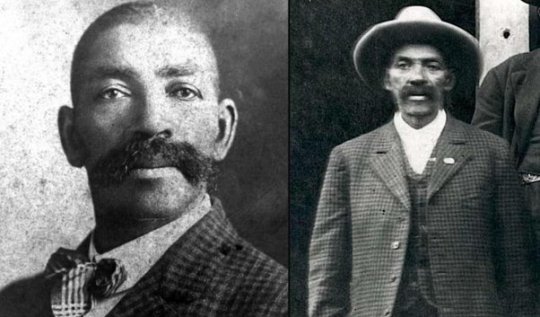
BASS REEVES. 1838-1910. U.S. Deputy Marshall.
Reeves was born into slavery then had a fight with his slave owner and ran and lived with the Cherokee and Creek people learning many native languages.
He became a free man under the 13th Amendment and later enlisted in Law Enforcement. He became the first African U.S. Deputy Marshall west of the Mississippi with full authority over the states of Texas, Oklahoma and Arkansas.
During his 32 years in office he personally went on to arrest over 3,000 dangerous criminals, shooting 14 in the process of arrest.
He was and STILL is the most prolific Law Enforcement Officer ever in the U.S.A.
He carried a Winchester Rifle and two Cal. 45 Colts and rode a snow white horse. Quite a few experts believe that he was the inspiration for ' The Lone Ranger' stories.

#bass reeves#us deputy marshall#cherokee#creek#texas#oklahoma#lone ranger#winchester rifle#kemetic dreams#african#law enforcement officer#usa#.45 colt#13th amendment
304 notes
·
View notes
Text
Intricate, invisible webs, just like this one, link some of the world’s largest food companies and most popular brands to jobs performed by U.S. prisoners nationwide, according to a sweeping two-year AP investigation into prison labor that tied hundreds of millions of dollars’ worth of agricultural products to goods sold on the open market.
They are among America’s most vulnerable laborers. If they refuse to work, some can jeopardize their chances of parole or face punishment like being sent to solitary confinement. They also are often excluded from protections guaranteed to almost all other full-time workers, even when they are seriously injured or killed on the job.
The goods these prisoners produce wind up in the supply chains of a dizzying array of products found in most American kitchens, from Frosted Flakes cereal and Ball Park hot dogs to Gold Medal flour, Coca-Cola and Riceland rice. They are on the shelves of virtually every supermarket in the country, including Kroger, Target, Aldi and Whole Foods. And some goods are exported, including to countries that have had products blocked from entering the U.S. for using forced or prison labor.
Many of the companies buying directly from prisons are violating their own policies against the use of such labor. But it’s completely legal, dating back largely to the need for labor to help rebuild the South’s shattered economy after the Civil War. Enshrined in the Constitution by the 13th Amendment, slavery and involuntary servitude are banned – except as punishment for a crime.
That clause is currently being challenged on the federal level, and efforts to remove similar language from state constitutions are expected to reach the ballot in about a dozen states this year.
Some prisoners work on the same plantation soil where slaves harvested cotton, tobacco and sugarcane more than 150 years ago, with some present-day images looking eerily similar to the past. In Louisiana, which has one of the country’s highest incarceration rates, men working on the “farm line” still stoop over crops stretching far into the distance. {read}
#article#prison#labor#workers#this is capitalism#capitalism is a scam#capitalism is violence#AP#associated press#slavery#13th amendment
7 notes
·
View notes
Text
https://x.com/ThatsAlpaca1/status/1702224625717961154?t=uFNEu7WzrNo37nOF_UaRYQ&s=09
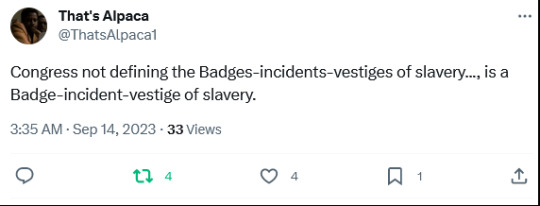
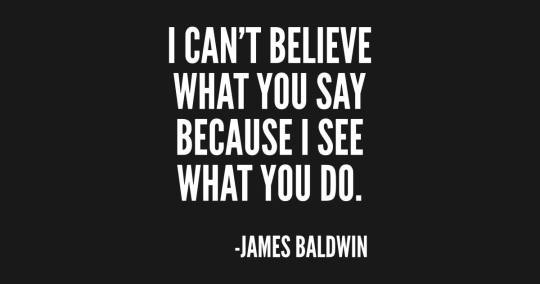
#Badges and Incidents of Slavery#Reparations#Vestiges of slavery#us congress#13th amendment#Black Freedmen#american lies#white lies
13 notes
·
View notes
Text
All people are equal... well, except for Sally of course.
I walked in late on a conversation somewhere on civil rights somewhere and this one sentence jumped out at me somewhere in it: "Neurodivergent queer computer engineers aren't being chemically castrated by the state in my country anymore." I always feel guilty quoting people at random like this, particularly when I agree with the overall point they're arguing, but the specific wording here really struck me because, well, I'm a neurodivergent queer computer engineer and I was totally chemically castrated by the state in my country. Now I'm not sure what country the person saying this lives in, but I don't think its true of any of them.
From context, this seems to be specifically referencing Alan Turing, for reasons I assume you know or can easily look up, and that would suggest we're talking about the U.K. and WOW is that country not an exception here. If I recall correctly there's at least one other country that will full on accept refugees from the U.K. with how badly they're persecuting queer people. And like, yeah, obviously what we're invoking here is a law, at the time, in the place, where being gay was illegal and this one cool nerd who wrecked Nazis' stuff accepted "chemical castration" in lieu of a prison sentence for it, and what I'm thinking about are the hoops trans people have to jump through getting medical treatments they don't need or want to get proper legal recognition and protections, but that's not comparing apples and oranges, that's comparing like... apples and red apples.
I have a larger point than this, but I'm gonna need to take you down a quick rabbit hole with me. I was just about to start going off about how "chemical castration" is a particularly emotionally charged term for testosterone blocking medication, then launch into how those get pushed on trans women to access a lot of medical treatments and rights even when they actively don't want them, and frankly they have really awful side effects for anyone taking them, at least at that dosage, and the more I look into things the more support I see for the idea that we should maybe just give trans femmes various estrogens and trust that if their T levels are too high they'll come down just from that, without having to deal with a powerful diuretic that trashes energy levels and causes other issues. But I like to be accurate, so I double checked, and holy crap what they actually forced Alan Turing to take was diethylstilbestrol. Functionally speaking, that's synthetic form of estrogen which used to be what they'd give trans women (and menopause sufferers, and everyone else who takes it) instead of estradiol, but stopped because it was kind of an extra strength version with more serious side-effects. So turns out, and I'm sorry, there's really no other way to put this- They force-femmed Alan Turing. That's far worse than what I thought he was put through and what I thought he was put through as already pretty monstrous.
But yeah, point still stands. While there's plenty of trans people who can't or don't want to get HRT, for all sorts of reasons (it not working on them, health risks for some people, the point I was going to make about T blockers making people feel awful, potential sexual performance and/or fertility issues, that stuff ain't free, the only options being to push the hormone sliders to absolute extremes of testosterone or estrogens at the exclusion of the other, which doubly sucks if you're nonbinary and actively avoiding that very choice, etc.) it's generally a formal requirement to go pretty hardcore with it for years before you can have anything else done, whether we're talking about other sorts of medical care, or basic legal recognition. Actual literal surgical-removal-of-gonads castration is also required for any sort of legal rights in decidedly more places than you'd think, and plenty of trans people would very much like to keep those before even getting into what an ordeal that sort of surgical procedure is to even access, if it's even possible for a given person.
So yeah, if you're looking at stuff specifically from the perspective of a cis guy who's gay or bi (or from any of the various demographics who'd never be in such a situation) you can look at what happened to Alan Turing, and go "wow what horrible bigotry-soaked times we used to live in. I couldn't even imagine that happening now. We sure have made some progress." And OK, sure, but like... seriously I personally know at least a hundred neurodivergent queer computer engineers who don't have to imagine that happening now, because it's an actual fact of life we really do have to live with, on top of this whole other thing where the horrible effects this had on Turing's body and mind being basically what all trans people have to live with for significant percentages of our lives jumping through hoops for decades to access what we need to correct weird endocrine issues causing that crap to happen "naturally."
Now I'd hope most of us would agree that this crap is horrific and nobody should have to do with it, with this big cognitive divide between people who sincerely believe nobody HAS had to deal with it for decades, because that's what they learned in school, and people who deal with it, and would very much like to stop doing so. And this causes big huge arguments between people demanding basic equality and people who don't comprehend that we don't actually have it and think people must be asking for something else... but you know, there's also bigots. Who not only don't agree that nobody should have to do with it, but were in the room when the sort of laws that ruined Alan Turing's life were struck down (or not actually struck down but we all agree not to enforce them, for now, until they gain enough power to start doing so without too much fear of reprisal), specifically digging in their heels to get some sort of weird compromise where OK they'll give up on making some of these people's lives a living hell, but only if some exception for some smaller group specifically gets carved out so they still have someone to bully and firmer grounds to rationalize it.
And the thing of it is, this pattern is all over the whole civil rights movement. And you know, legislation in general really. OK, we can have government health care for the ultra-poor, but only if we can really screw over people in SOME income bracket, and also sabotage the whole thing with weird arbitrary restrictions. We can give people financial aid, but we have to make the application and renewal processes a full time hell job with a ton of triggers that get it pulled, including getting their feet partway under them financially.
There's been a whole thing in the past 5 years where people are shedding light on how it's not really true that women in the U.S. were categorically given to vote when the 19th amendment passed, pointing out various sub-groups who still couldn't vote, and what sort of legal reforms it took for each to be able (and honestly, there's still plenty who can't for various reasons). And then we have further conversations on how it's not like all these loopholes weren't being discussed within the suffrage movent. People were quite aware, but white supremacists and people who wanted not to alienate white supremacists pushed to exclude all these other people and focus the whole movement on white women specifically.
And hey, speaking of amendments that didn't actually do what we're all taught they did, you ever actually read the 13th? Here's the actual wording:
"Neither slavery nor involuntary servitude, except as a punishment for crime whereof the party shall have been duly convicted, shall exist within the United States, or any place subject to their jurisdiction."
That is a HELL of an exception in the middle there! Slavery is totally illegal... unless we send you to jail first. Oh by the way, we're hiring all these now out of work slave-catchers to work as cops and building more prisons than any other country in the world and having those prisoners do a bunch of manual labor for which the owners of those prisons get paid.
Anyway, the real obvious take away to all of this is that bigots will always cling to keeping some group of people they can kick around no matter what, and efforts to compromise with them will always involve sacrificing people to that sick desire, which is morally indefensible and should never been done.
The less obvious takeaway is that we all collectively turn a blind eye to that because we keep teaching these sanitized "arc of history bends ever towards freedom" success myths rather than be honest and point out how these exceptions get carved out. Pretty sure we'd be in a better place politically if we actually taught kids things like "so that slavery thing the civil war was fought over didn't even actually stop after that. It's still being done today even, because the horrifically evil pro-slavery managed to get this loophole carved out to keep doing it." Let's test my theory or something.
#civil rights#13th amendment#slavery#19th amendment#women's suffrage#alan turing#trans rights#bigotry#they force femmed alan turing#I'm really sorry if your name is Sally I didn't mean to single you out you deserve equality too I just needed a random name
5 notes
·
View notes